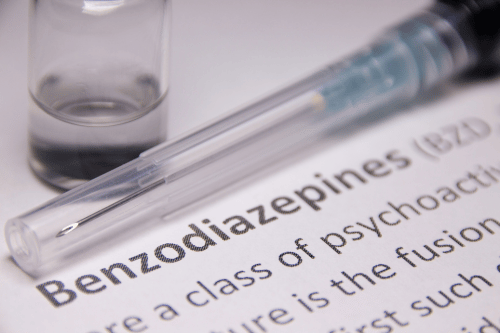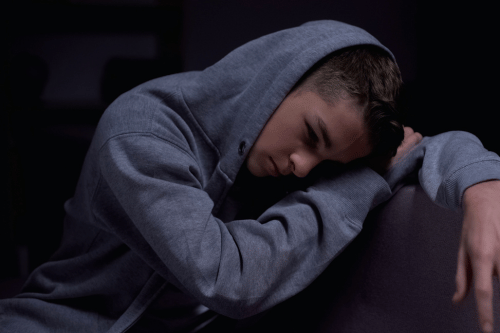

Benzodiazepine withdrawal is a serious medical condition that can affect individuals who stop or reduce their use of these sedative medications. Benzodiazepines like diazepam, lorazepam, alprazolam, and clonazepam are commonly prescribed for anxiety, panic, insomnia, and seizures. However, regular use can lead to physical dependence, addiction, and severe withdrawal symptoms that impact the brain, cognition, and overall health.
These symptoms may include dizziness, nausea, palpitations, and confusion—especially in patients with co-occurring substance abuse or alcohol use. Clinical intervention, therapy, and proper medication management are essential for reducing the risk of long-term benzodiazepine use disorder and improving patient outcomes.
Benzodiazepines are a class of sedative-hypnotic drugs used to treat anxiety, panic disorders, insomnia, seizures, and muscle spasms. Common medications include diazepam, alprazolam, lorazepam, clonazepam, oxazepam, nitrazepam, temazepam, and chlordiazepoxide. These medications function by enhancing GABA activity in the central nervous system, reducing neuron excitability and promoting calm behavior, sleep, and relaxation.
They are prescribed for short-term relief but carry a high risk of substance dependence, especially with long-term use. Benzodiazepines can also interact dangerously with alcohol, opioids, or amphetamines, increasing the chance of overdose or severe sedation. Because of these risks, the British National Formulary recommends cautious dosing and close clinical monitoring to prevent misuse and rebound effects like worsened anxiety or insomnia.
Regular benzodiazepine use can lead to tolerance and physical dependence. As the brain adapts to the medication, GABA receptor sensitivity decreases, requiring higher doses to maintain the same sedative, anxiolytic, or hypnotic effect. Over time, the risk of developing benzodiazepine use disorder rises, particularly when used without physician oversight or combined with other substances.
Dependence can affect cognition, attention, and memory, often without the patient noticing until withdrawal begins. Individuals may experience stress, panic, or insomnia when trying to reduce their dose, especially if they attempt to quit cold turkey. At Sullivan Recovery, we see how unmanaged drug withdrawal from medications like flurazepam or nitrazepam can trigger serious symptoms, including seizures, palpitations, and nausea, reinforcing the cycle of addiction and further medication use.

Withdrawal symptoms can be intense and vary depending on the dose, duration of use, and the specific benzodiazepine taken. Common symptoms include:
These symptoms are a direct result of GABA dysregulation in the nervous system. Stopping the medication cold turkey can trigger severe effects and even life-threatening complications such as seizures.
The onset and intensity of benzodiazepine withdrawal depend on the half-life of the drug and individual factors. Short-acting medications like alprazolam or lorazepam may produce symptoms within 6 to 12 hours, often starting with anxiety, nausea, dizziness, or perspiration. Long-acting ones like diazepam, chlordiazepoxide, or flurazepam may delay symptoms for several days, but withdrawal may still include photophobia, paresthesia, and tremors.
Acute withdrawal lasts from a few days to several weeks and can cause mood changes, insomnia, appetite loss, headache, and even suicidal ideation. This is often followed by post-acute withdrawal syndrome (PAWS), which brings prolonged disturbances in sleep, cognition, attention, and motivation. During this time, patients may also report tinnitus, confusion, irritability, or derealization—symptoms that require clinical support and ongoing therapy to manage effectively.

Many patients experience a rebound effect during withdrawal. Symptoms originally treated by the drug—such as anxiety, insomnia, or seizures—return with greater intensity due to GABA receptor dysfunction in the brain and nervous system. This heightened state of panic or agitation can be accompanied by elevated blood pressure, palpitations, or rebound insomnia, making the patient more likely to relapse into medication or alcohol use.
This rebound effect worsens with abrupt cessation or when the patient attempts detox without physician supervision. It increases the risk of developing long-term substance abuse behavior and benzodiazepine use disorder. Clinical interventions using tapering protocols, anxiolytic alternatives like trazodone, and therapy focused on coping strategies can reduce the rebound severity and prevent the cycle of prescription drug addiction.
Benzodiazepine withdrawal carries serious health risks, particularly for those with co-occurring substance abuse or alcohol dependence. Withdrawal can aggravate conditions like depression, suicidal ideation, or agoraphobia. It can also impact cognition, attention, and memory. In some cases, life-threatening seizures may occur, especially if the individual has a history of high-dose use or other central nervous system depressants.
Patients experiencing benzodiazepine withdrawal require medical supervision. A physician may implement a tapering schedule, gradually lowering the dose to reduce risks. Medications like carbamazepine, phenobarbital, trazodone, or selective serotonin reuptake inhibitors (SSRIs) may help manage symptoms. Detox programs often include therapy, behavioral support, and ongoing monitoring of blood pressure, sleep, mood, and cognition.
At Sullivan Recovery in Mission Viejo, we offer outpatient treatment programs for individuals with benzodiazepine use disorder. Our clinical team guides patients through structured detox while supporting their physical and mental health. Outpatient therapy allows individuals to receive daily medical care, counseling, and coping strategies while maintaining daily responsibilities.
Benzodiazepine withdrawal differs from opioid use disorder or amphetamine withdrawal due to the high seizure risk and rebound anxiety. Unlike many other drugs, the effects of long-term sedative use are deeply tied to GABA receptors and central nervous system regulation. This makes professional treatment essential for managing both short-term symptoms and long-term recovery goals.

Behavioral therapy is a key component of benzodiazepine withdrawal treatment. Patients often benefit from cognitive-behavioral therapy (CBT), group sessions, and stress reduction practices. Therapy addresses underlying issues such as panic, insomnia, or depression that may have led to medication misuse. It also helps patients learn new coping behaviors for long-term recovery.
During benzodiazepine withdrawal, physicians may prescribe alternative medications to support stabilization. Long-acting benzodiazepines like diazepam or chlordiazepoxide are often used for tapering. Nonbenzodiazepine options such as SSRIs or trazodone may treat anxiety or sleep issues. These medications reduce withdrawal symptoms without reinforcing addiction.
Attempting to stop benzodiazepine use without medical help—also known as going cold turkey—can be dangerous. Sudden withdrawal can lead to seizures, confusion, paranoia, and cardiovascular issues. It is critical to seek help from a qualified physician or detox facility to avoid health risks and ensure a safe recovery.
Sleep problems are common in benzodiazepine withdrawal. Patients may experience insomnia, vivid dreams, or sleep fragmentation. Memory and cognition can also suffer as GABA activity stabilizes. At Sullivan Recovery, we monitor brain function and provide strategies to improve sleep hygiene, focus, and mental clarity throughout the withdrawal process.

Pregnancy complicates benzodiazepine withdrawal. Stopping sedatives suddenly can cause fetal distress or seizures in the mother. A carefully managed taper plan, under a physician’s supervision, is necessary to reduce risks. Medication adjustments and therapy can support both maternal and fetal health during this sensitive time.
Support systems are essential for patients going through benzodiazepine withdrawal. Family members, therapists, and outpatient clinics play a role in monitoring symptoms, encouraging motivation, and providing emotional support. Education and access to information about the condition empower both the patient and their caregivers.
Recovery from benzodiazepine use disorder takes time. While the physical symptoms fade, psychological effects like fear, stress, or cravings can persist. Long-term care includes therapy, medication management, and regular check-ins with medical providers. Sullivan Recovery’s outpatient programs offer consistent structure and resources to help patients stay on track.
Understanding the pharmacology of benzodiazepines helps explain withdrawal. These drugs bind to GABA-A receptors in the brain, producing a sedative and anxiolytic effect. Withdrawal causes an imbalance in neurotransmitters, especially when GABA is suddenly reduced. This disruption can affect neurons, attention, cognition, and physical health.
Signs of benzodiazepine withdrawal can be physical, emotional, or cognitive. Early signs include dizziness, perspiration, irritability, nausea, and appetite changes. As symptoms progress, individuals may experience confusion, derealization, suicidal ideation, and seizures. Recognizing these signs early can prevent complications and guide timely intervention.
Outpatient detox allows patients to safely taper benzodiazepines under clinical supervision without full hospitalization. This process helps reduce physical dependence by gradually adjusting the dose, preventing cold turkey withdrawal symptoms like seizures, vomiting, or paresthesia. The taper may involve long-acting agents such as diazepam or chlordiazepoxide to stabilize GABA activity in the central nervous system.
At Sullivan Recovery, patients attend regular appointments for check-ins, therapy, and medication monitoring. Physicians assess blood pressure, cognition, memory, and stress levels, adjusting treatment plans as symptoms like dizziness, palpitations, or nausea emerge. For those with co-occurring substance abuse issues—such as alcohol or opioid use disorder—additional pharmacology support like carbamazepine or nonbenzodiazepine anxiolytics may be included.
This setting is ideal for those with supportive environments, lower-dose dependence, or those transitioning from inpatient care. Patients learn behavior modification and coping skills while managing withdrawal symptoms like insomnia, photophobia, or reduced appetite. Therapy sessions also address fear, confusion, and motivation, helping the patient stay focused on recovery and reduce the long-term risk of prescription drug addiction.
Benzodiazepine withdrawal is a complex condition that affects the brain, nervous system, and behavior. Stopping these medications suddenly can lead to seizures, panic, insomnia, and confusion. With the right treatment plan—including therapy, physician-guided tapering, and outpatient care—patients can recover safely.
If you or a loved one is struggling with benzodiazepine use disorder or withdrawal, contact Sullivan Recovery in Mission Viejo. Our outpatient programs provide safe, evidence-based support to help patients overcome substance dependence and reclaim their health.
At Sullivan Recovery, as an in-network provider we work with most insurance plans, such as:
And More
If you or a loved one are struggling with mental health challenges or substance abuse, reach out to Sullivan Recovery today. Our team of compassionate professionals is here to support your journey towards lasting well-being. Give us a call at 949-836-7180.
Yes, in severe cases, benzodiazepine withdrawal can be life-threatening—particularly if stopped suddenly after long-term or high-dose use. Risks include seizures, dangerously high blood pressure, and heart complications. Medical supervision is critical during detox to prevent serious health outcomes.
Tapering schedules vary based on the dose, duration of use, and specific drug involved. In general, a taper may last several weeks to a few months, with gradual dose reductions every 1–2 weeks. Physicians may substitute a long-acting benzodiazepine like diazepam to stabilize withdrawal.
Some individuals explore supplements like magnesium, melatonin, or omega-3s to support sleep, mood, or nervous system health during withdrawal. However, these should never replace medical treatment and may interact with medications. Always consult a physician before using any supplements during detox.
Yes, withdrawal can unmask or intensify underlying conditions like generalized anxiety disorder, depression, or panic disorder. In some cases, symptoms like paranoia or derealization may resemble psychosis. A clinical team can assess whether symptoms are withdrawal-related or part of a co-occurring mental health diagnosis.